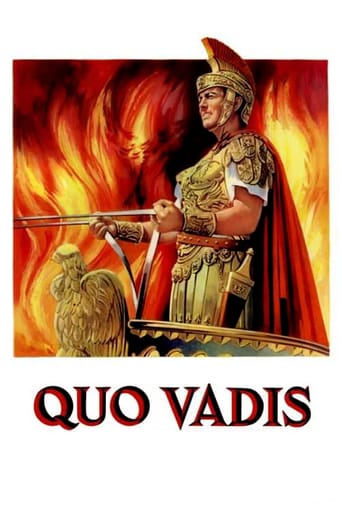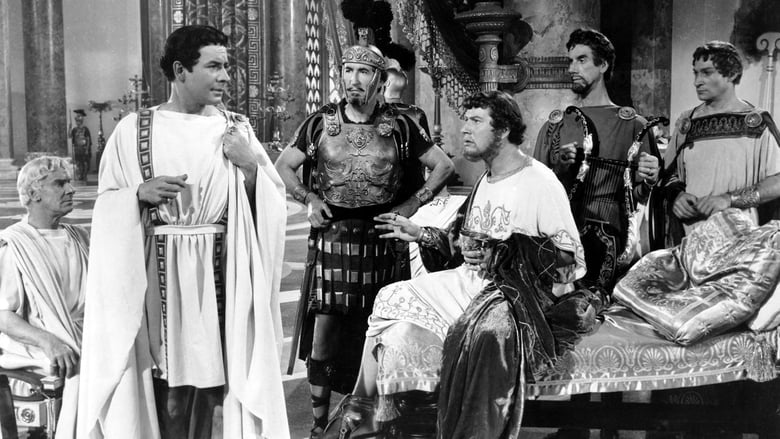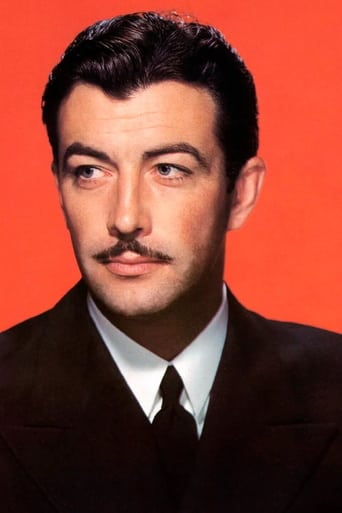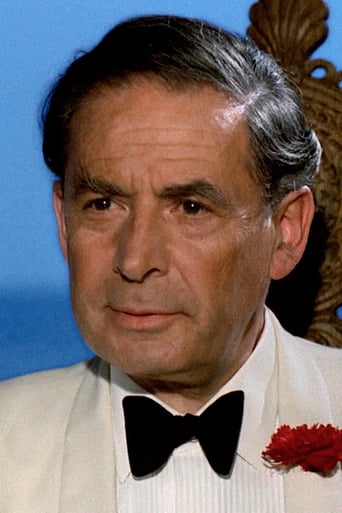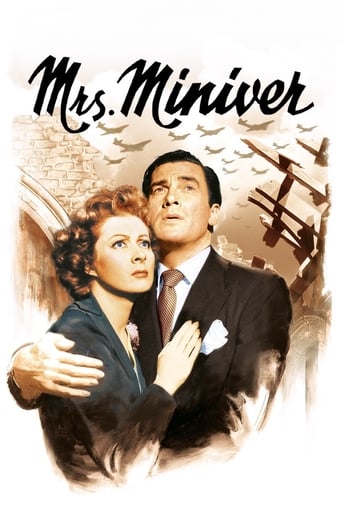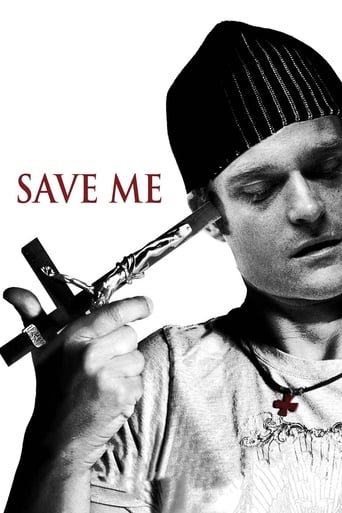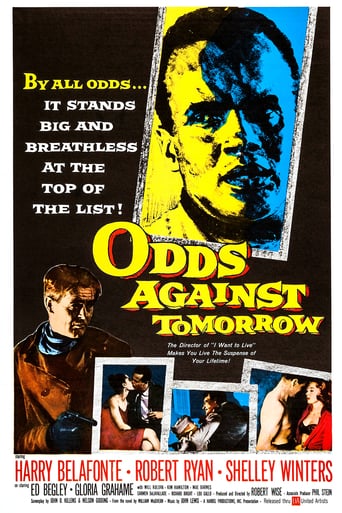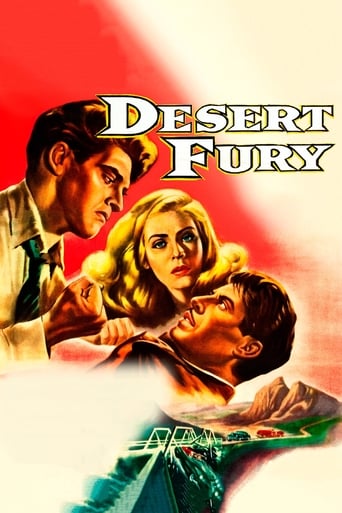Quo Vadis (1951)
After fierce Roman commander Marcus Vinicius becomes infatuated with beautiful Christian hostage Lygia, he begins to question the tyrannical leadership of the despotic emperor Nero.
Watch Trailer
Cast


Similar titles
Reviews
When a movie has you begging for it to end not even half way through it's pure crap. We've all seen this movie and this characters millions of times, nothing new in it. Don't waste your time.
There is, somehow, an interesting story here, as well as some good acting. There are also some good scenes
It really made me laugh, but for some moments I was tearing up because I could relate so much.
Great example of an old-fashioned, pure-at-heart escapist event movie that doesn't pretend to be anything that it's not and has boat loads of fun being its own ludicrous self.
Whither goest thou ? ... is what my translation program came up with. There have been many remakes of this story over the years; this one starring Robert Taylor and Deborah Kerr as Marcus and Lygia. Peter Ustinov, who could play anything is in here as Nero. Roman Marcus falls for christian Lygia. And the un-mistake-able voice of Walter Pidgeon narrating the whole deal. imdb says that both sophia loren and liz taylor are in uncredited roles. Lots of pomp and circumstance, befitting emporer nero. large crowds of ceremonies and extras. Everyone recites their lines almost in monotone, perhaps to symbolize the royal order of the empire, or maybe just because they were all bored with the predictable script. It's very okay. One of the more interesting characters here is "Poppaea", empress to Nero. Agnes Moorehead would have been PERFECT in this evil, scheming role. Nominated for many oscars, but didn't win any. Directed by Mervyn LeRoy. He was nominated for Best Director Random Harvest, but received two honorary awards later on. This is earlier Peter Ustinov, before he got bigger and older. Interesting bit of history, but it's another big hollywood set piece.
Of the half-dozen film versions that have been made from the novel by Nobel Prize winner, the Polish Henryk Sienkiewicz (1846-1916), the most successful and widespread was that of Mervyn LeRoy. Counting on the cast with such star-studded figures as Robert Taylor, Deborah Kerr and Peter Ustinov, he adapted the grandiose epic and romantic story set in the era of decline and disappearance of the first dynasty of Roman emperors (Julius-Claudius, 27 BC-68 AD), of which the last was Nero. In the middle of the splendor and expansion of one of the most powerful empires that ever existed, a young patrician and Roman soldier falls in love with a beautiful foreign host in a Christian home. He will soon understand, to his great disappointment and torment, that he will not be able to seduce her like any Roman woman, nor make her his mistress. These are hard times. Nero is a bad emperor. His mental disorders and his excesses are leading to Rome to chaos and ruin. He is surrounded by both competent men (the elegant, epicurean and intelligent Petronius, the great philosopher Seneca) who try to breathe in some sanity, as ambitious men who seek only their own recognition. Nero's delusions outline a threat that will soon become a reality. All Rome will pay a very high price. Both the fire that will devour the city, and the arrest and extermination of many Christians who live peacefully with the rest of the population, will mark a deadly time. Ligia, the beloved of the soldier Vinicio, is Christian, with which it is in serious danger. He, leaving behind his résumé of superfluous delights, throws himself head first to his authentic love and, realizing that he can only earn it with his heart, will do everything possible to save her from the city threatened by fire and the clutches of the Collective madness that is wreaking havoc with the Christians, making them suffer for believing them the authors of the catastrophe that destroys Rome. This epic drama is a reflection of an era in which Christianity had expanded enormously and was beginning to suffer the consequences of constituting a form of religious worship that was still seen in Rome with suspicion. It is also the reflection of the end of the first imperial period that happened to the Roman Republic, with the intermediate transition of Julius Caesar. A love that has to overcome great obstacles, the progressive maturity and religious conversion of a man deeply in love, the exaltation of the new faith, the annihilation of reason and peace at the hands of a lunatic ruler, and the destruction of much more Which is the most important city in the world. The fall of past beauty, of a past glory that is consumed in the flames and vanishes with smoke. Nothing will be the same. But the cycles are always renewed, and new lives and new illusions will continue walking along the path of the times, becoming the eternal question: "Where we go?"
Apart from the good costume drama an excellent performance by Peter Ustinov and excellent orchestra this movie is nothing but Propaganda. First of all this was not a historical event though the characters are based on historical figures. It is based on a book by a 19th century Polish author the purpose being to emphasis Victorian value's through a romantic setting to be more aesthetic. This film for today is now completely out dated. This film should be only studied in film history or propaganda technique. the historical errors in it are great which makes criticism of this legitimate. For one "Christian" back then was not Christian in the Modern meaning of the word. Back then in modern terms Christian meant Messianic Jews not interested in Proselytising. It was not yet an established religion that later became differing sects with a lot of different gospels a century later adapting external influence's. These later early Christians were tolerated as was Roman policy and rarely thrown to the Lions. Also all Eastern cults were treated with cynicism at the time. Evidence also shows Nero helped and aided the innocent and vulnerable during the great fire but to improve on what had burnt he did not have enough cash which was his downfall. It is also funny how Christians rant and invent stories about their persecution but ignore the atrocities and intolerance of their own actions such as how they decimated the Pagans 400 years later after Nero whilst stealing their ideas. Who really is the victim?
"Quo Vadis?", based upon a novel by the Polish writer Henryk Sienkiewicz, might not be the film which launched the epic revival of the fifties and early sixties; that was probably DeMille's "Samson and Delilah" made two years earlier. It was, however, responsible for the popularity of epics dealing with the early history of Christianity and its persecution by the Roman Emperors; others include "The Robe", its sequel "Demetrius and the Gladiators", "The Silver Chalice", "Barabbas" and, of course, "Ben-Hur". The title (Latin for "Where are you going?") refers to an incident in which Saint Peter, fleeing from the persecutions of the Emperor Nero, was persuaded to return to Rome and face martyrdom by a vision of Christ. Although the only source for this non-Biblical story is the apocryphal "Acts of Peter", it has become part of Christian tradition, and is re-enacted in this film, in which both Peter and Nero are important characters. The main story, set against the background of the anti-Christian persecutions and the Great Fire of Rome, deals with the love of Marcus Vinicius, a Roman military commander, and the Christian girl Lygia. (Lygia is named after her native land, corresponding roughly to southern Poland. As it lay a long way outside the boundaries of the Roman Empire, it is unlikely a native of the region would have made her way to Rome, but the patriotic Sienkiewicz presumably wanted to make his heroine a fellow-countrywoman). As with most epics, the film often departs radically from historical truth. In the film the fire is started by Nero himself, encouraged by his wife Poppaea, an act which leads directly to his overthrow when the Roman populace realise that he, not the Christians whom he has falsely blamed, was responsible. Nero kills Poppaea shortly before his own suicide. In reality the Great Fire took place in 64 AD, four years before Nero's downfall. Poppaea died of unknown causes in 65; many historians now doubt contemporary reports that Nero was responsible for her death. At the time of his own death Nero was married to Statilia Messalina, who survived him. In reality the philosopher Seneca also died in 65 and the courtier Petronius in 66; here Seneca survives Nero and Petronius dies shortly before him. Lygia is made the adopted daughter of a retired general, Aulus Plautius, a real historical figure here presented as a devout Christian, .although there is no historical evidence for this. (His wife Pomponia was accused of following a "foreign superstition", which may or may not have been Christianity). These discrepancies, however, mostly derive from the original novel and cannot simply be dismissed as "Hollywood goofs". Like any good novelist, Sienkiewicz realised the importance of a good story, and the film-makers were right to follow his example. Any attempt to "correct" his "errors" and to make the film follow history more faithfully would merely have weakened the power of his story. One thing that might strike a modern viewer is a certain note of misogyny running through the film. Poppaea is a venomous shrew and the other main female characters all fall hopelessly in love with men who have mistreated them- Lygia with Marcus, who effectively kidnaps her, the slave-girl Eunice with Petronius, who has had her whipped, and Nero's former mistress Acte remains infatuated with him despite his treatment of her and his obvious villainy. The movie is dominated by the male characters; the only outstanding female contribution comes from Patricia Laffan as the evil Poppaea. Deborah Kerr, makes a weak, milk- and-water Lygia, more plaster saint than Christian heroine. The original intention was to cast the teenage Elizabeth Taylor in the role, and she might well have made Lygia more spirited. Robert Taylor, however, is fine as Marcus. Although officially the hero he is not, in the early part of the film, altogether sympathetic, and Taylor brings out the hardness and arrogance which have been inculcated in him by his pagan upbringing and which gradually soften under the influence of Lygia's Christian beliefs. Other good contributions come from Finlay Currie as Saint Peter and Buddy Baer as Lygia's gigantic bodyguard Ursus. (Coincidentally "Ursus" means "bear" in Latin and "Baer" has the same meaning in German). Leo Genn is also good as Petronius, a man who initially seems like a shameless flatterer of Nero, yet whose flattery hides some sage advice and who proves himself capable of courage when he realises that he can no longer restrain the Emperor's evil nature. I suspect that Peter Ustinov's Nero will divide viewers, even though at the time he was nominated for a "Best Supporting Actor" Oscar. (Genn was nominated for the same award). When I first saw the film I disliked his performance, thinking him too comical, effete and unthreatening. Having recently seen it again I have changed my mind; the historical Nero was probably much closer to the camp, childish, petulant, conceited and self-pitying wimp portrayed by Ustinov than to the ranting Hitler-style dictator which is how I had previously envisioned him. Ustinov makes us realise, as Chaplin did in "The Great Dictator", that tyrants can be ridiculous even at their most frightening. The one thing every epic needs to succeed is spectacle, and plenty of it. (One reason "The Silver Chalice" was such a flop is that its producers tried to dispense with this essential ingredient and make an epic on the cheap). And "Quo Vadis" has spectacle in spades. Even more than "Samson and Delilah", it started the trend for film-making on a grand scale which was to culminate in "Spartacus", "Ben-Hur" and "Cleopatra". The scenes of the Great Fire and of the games in the arena are particularly well done. I would not rate it quite as high as what I regard as the "Big Four" epics ("The Ten Commandments", "Ben-Hur", "Spartacus" and "El Cid"), but it is not far behind. 8/10

